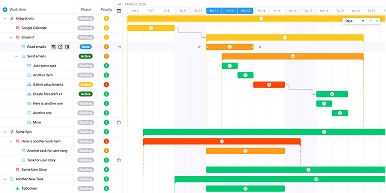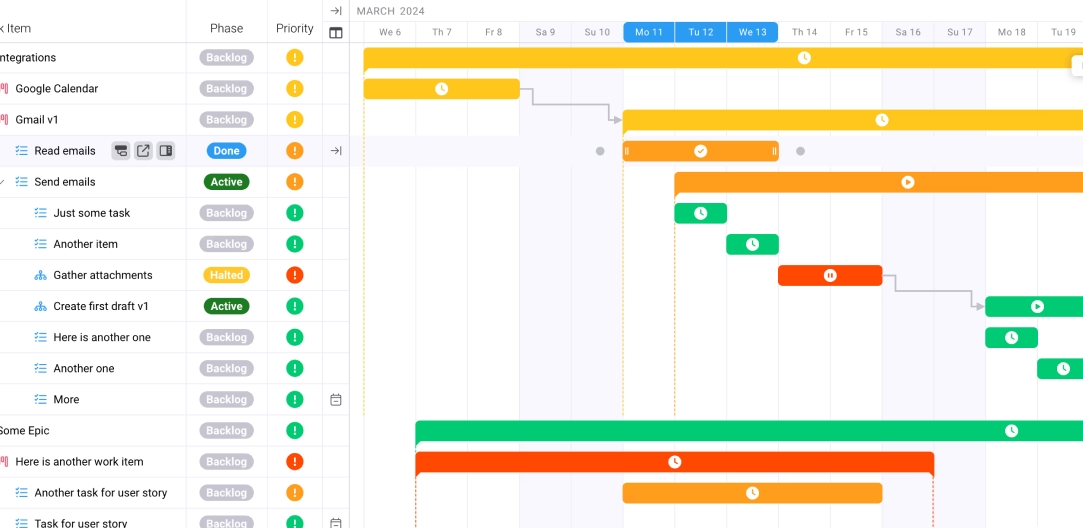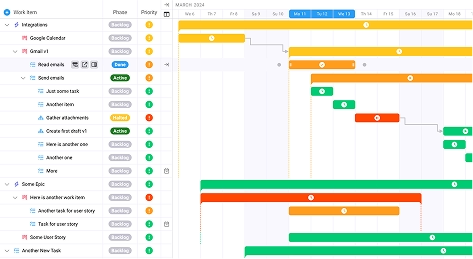
BigTime vs. Scoro: Strengths and Weaknesses
Key takeaways:
When evaluating BigTime vs. Scoro for your professional services organization, you're facing a decision that could significantly impact your operational efficiency and bottom line. Both platforms position themselves as comprehensive solutions for agencies and professional services firms, yet each takes a fundamentally different approach to project management, resource allocation, and client service delivery. Understanding the specific strengths and weaknesses in this BigTime vs. Scoro comparison becomes crucial for making an informed investment decision.
The professional services automation landscape has experienced explosive growth, with currently in 2025, the industry revenue of project management software is estimated at USD 12.6 billion. This expansion reflects the critical importance of selecting the right platform to drive operational success and competitive advantage.
The Current Challenge: Why Platform Selection Matters More Than Ever
Professional services organizations face unprecedented complexity in their daily operations. 58% of U.S. businesses experience software purchase regret, highlighting the critical importance of thorough evaluation before making platform commitments. The consequences of choosing incorrectly extend far beyond initial implementation costs.
70% of agencies are choosing work management platforms based on features they'll never use, while ignoring the fundamental capabilities that actually drive profitability. This backwards approach to platform selection isn't just wasting money—it's actively undermining team productivity and client satisfaction.
The stakes continue rising as the project management software market is expected to reach USD 20.20 billion by 2030, growing at a CAGR of 15.65%. This growth reflects not just market expansion, but the increasing sophistication of available solutions and the corresponding complexity of selection decisions.
Understanding the competitive landscape becomes even more important when considering that the United States' professional services automation (PSA) market is exploding, with its compound annual growth rate (CAGR) expected to reach 10% through 2030. Organizations that make strategic platform choices position themselves for sustained growth, while those selecting inadequate solutions find themselves constrained by their technology decisions.
BigTime: Core Strengths and Operational Focus
BigTime has built its reputation around time tracking precision and project-centric workflows. The platform excels in environments where accurate time capture and detailed project accounting take priority over broader operational integration.
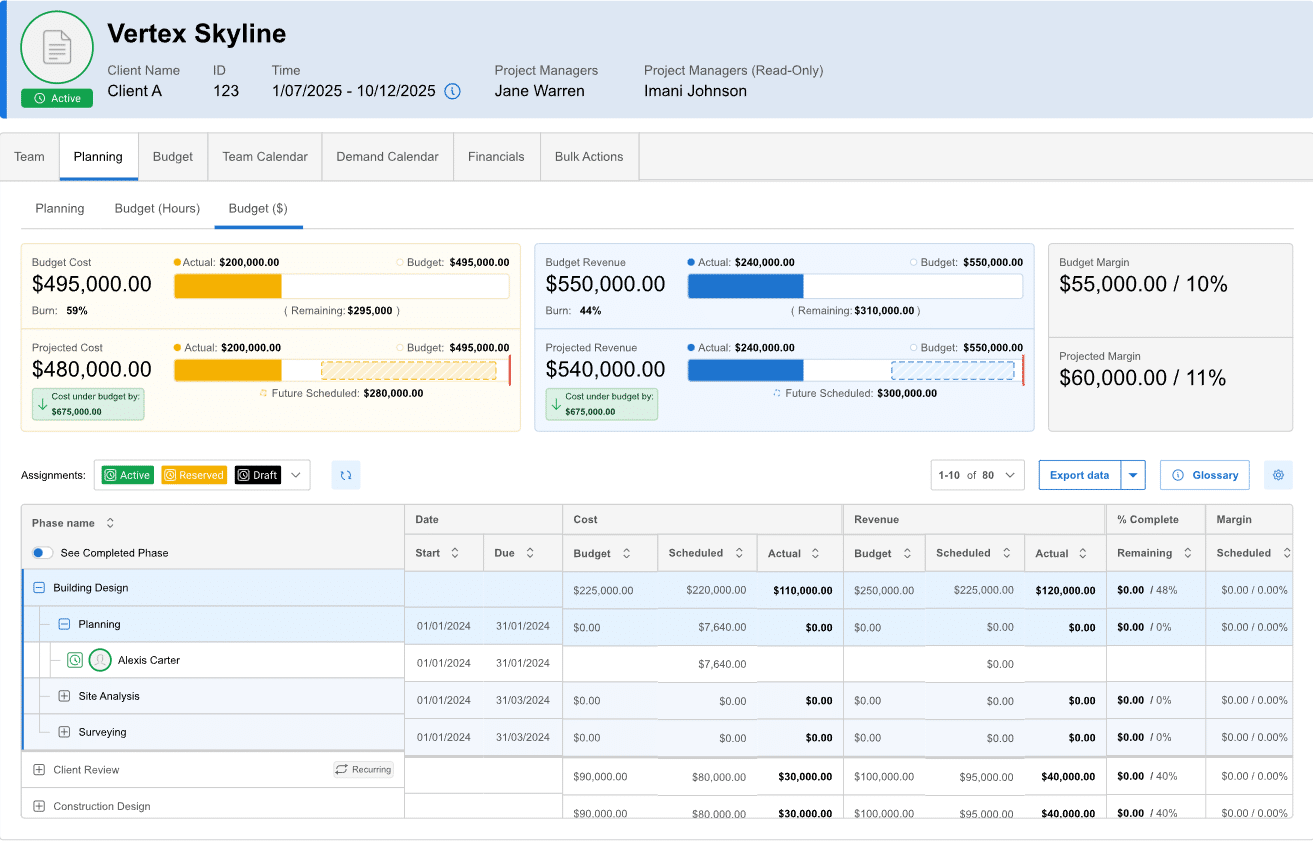
Time Management Superiority
BigTime's primary strength lies in its sophisticated approach to time tracking and expense management. The platform provides granular controls for billable hour capture, automated time entry suggestions, and comprehensive expense categorization. For professional services firms where accurate time tracking directly correlates to revenue recognition, these capabilities represent significant competitive advantages.
The platform's mobile time tracking functionality supports real-time entry across multiple devices, ensuring that billable moments aren't lost during client interactions or field work. Advanced approval workflows allow managers to maintain oversight while empowering team members to manage their time autonomously.
Project Accounting Excellence
BigTime demonstrates particular strength in project financial management, offering detailed budget tracking, variance analysis, and profitability reporting. The platform's approach to project accounting enables managers to identify cost overruns early and adjust resource allocation to maintain profitability margins.
Budget forecasting capabilities help organizations plan resource allocation across multiple concurrent projects, while real-time financial dashboards provide immediate visibility into project health and organizational performance metrics.
Reporting and Analytics Capabilities
The platform's reporting engine provides comprehensive visibility into organizational performance across multiple dimensions. Custom report building allows managers to create specific views tailored to their unique operational requirements, while standard reports address common professional services metrics.
Advanced analytics features enable trend identification, resource utilization analysis, and client profitability assessment. These insights support strategic decision-making and operational optimization efforts.
BigTime: Notable Limitations and Constraints
Despite its strengths in time tracking and project accounting, BigTime exhibits several limitations that may constrain organizational effectiveness in broader operational contexts.
Limited CRM Integration
BigTime's customer relationship management capabilities remain relatively basic compared to dedicated CRM platforms or more comprehensive professional services automation solutions. The platform focuses primarily on project delivery rather than comprehensive client lifecycle management.
This limitation becomes particularly apparent for organizations that require sophisticated sales pipeline management, marketing automation integration, or comprehensive client communication tracking. Teams often need to maintain separate CRM systems, creating data silos and administrative overhead.
Workflow Customization Constraints
While BigTime provides solid project management functionality, its workflow customization options remain somewhat rigid compared to more flexible alternatives. Organizations with unique operational processes may find themselves adapting their workflows to fit the platform's constraints rather than configuring the system to support their preferred approaches.
This inflexibility can create adoption challenges, particularly for teams accustomed to specific operational rhythms or client service methodologies that don't align perfectly with BigTime's default workflows.
Client Portal Limitations
BigTime's client portal functionality, while functional, lacks the sophistication and user experience polish found in more comprehensive platforms. Client collaboration features remain basic, potentially limiting the platform's effectiveness for organizations that prioritize transparent client communication and collaborative project delivery.
Scoro: Comprehensive Business Management Approach
Scoro positions itself as an all-in-one business management solution, extending beyond traditional project management to encompass comprehensive operational support for professional services organizations.
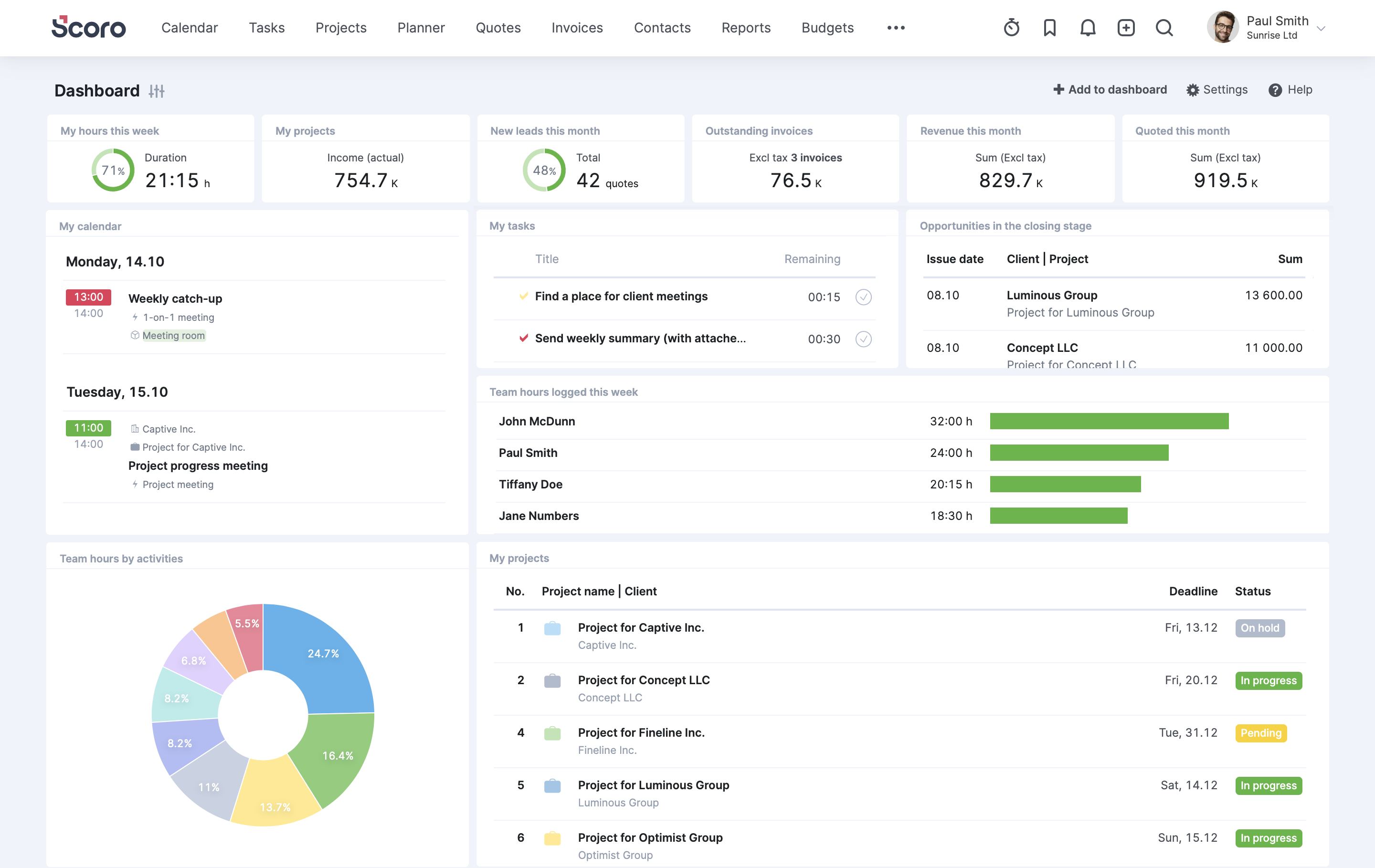
Integrated Business Operations
Scoro's primary strength lies in its comprehensive approach to business management integration. The platform combines project management, CRM, financial management, and reporting within a unified interface, reducing the need for multiple specialized tools.
This integration approach aligns with the recognition that an all-in-one solution ensures that all aspects of project delivery are interconnected, enhancing efficiency and reducing errors. Organizations benefit from seamless data flow between different operational areas, eliminating manual data entry and reducing synchronization errors.
Advanced Reporting and Dashboards
Scoro excels in providing comprehensive business intelligence through sophisticated reporting capabilities and customizable dashboards. The platform offers pre-built reports for common professional services metrics while enabling custom report creation for unique organizational requirements.
Real-time dashboards provide immediate visibility into project progress, team performance, financial metrics, and client satisfaction indicators. This comprehensive visibility supports both operational management and strategic decision-making processes.
Resource Management Sophistication
The platform's resource management capabilities extend beyond basic time tracking to encompass comprehensive capacity planning, skill-based resource allocation, and workload balancing. Advanced features include resource forecasting, utilization optimization, and automated resource scheduling suggestions.
These capabilities become particularly valuable for larger organizations managing complex resource allocation across multiple projects, clients, and service lines. The platform helps organizations maximize resource utilization while maintaining service quality standards.
Financial Management Integration
Scoro's financial management features encompass comprehensive budgeting, invoicing, expense tracking, and profitability analysis. The platform's approach to financial integration ensures that project financial data flows seamlessly into broader organizational financial management processes.
Advanced features include automated invoicing based on project milestones, comprehensive expense categorization, and detailed profitability analysis across projects, clients, and service offerings.
Scoro: Operational Limitations and Complexity Challenges
Despite its comprehensive feature set, Scoro presents several limitations that may impact organizational effectiveness, particularly for smaller teams or organizations with simpler operational requirements.
Implementation Complexity
Scoro's comprehensive feature set creates corresponding implementation complexity. Organizations often require significant time investment for proper configuration, user training, and workflow optimization. The platform's flexibility becomes a constraint when teams lack the resources or expertise necessary for effective customization.
This complexity can delay implementation timelines and increase total cost of ownership beyond initial subscription fees. Organizations must factor in training costs, configuration time, and potential productivity losses during transition periods.
User Experience Challenges
While Scoro offers comprehensive functionality, its user interface can feel overwhelming for team members who require simple, focused workflows. The platform's emphasis on comprehensive features sometimes compromises ease of use, particularly for occasional users or team members with limited technical sophistication.
Navigation complexity can impact user adoption rates and overall organizational productivity, particularly during initial implementation phases.
Overwhelming Feature Abundance
Scoro's extensive feature set can create decision paralysis and configuration complexity. Organizations may struggle to identify which features provide value for their specific operational requirements versus which features represent unnecessary complexity.
The platform's comprehensive approach, while valuable for organizations requiring extensive functionality, can overwhelm smaller teams or organizations with simpler operational needs.
Comparative Analysis: Strategic Considerations
When evaluating BigTime vs. Scoro, organizations must consider their specific operational requirements, team dynamics, and growth trajectories to make informed decisions.
Organizational Size and Complexity
BigTime tends to serve smaller to mid-sized professional services organizations more effectively, particularly those with straightforward operational requirements and emphasis on accurate time tracking. The platform's focused approach aligns well with organizations that prioritize simplicity and efficiency over comprehensive feature sets.
Scoro better serves larger organizations or those requiring comprehensive business management integration. The platform's extensive features justify their complexity when organizations can leverage multiple functional areas effectively.
Industry-Specific Requirements
Professional services organizations with traditional billable hour models may find BigTime's time tracking sophistication particularly valuable. The platform's project accounting capabilities align well with organizations requiring detailed financial tracking and client billing accuracy.
Organizations requiring comprehensive client lifecycle management, marketing automation integration, or complex resource allocation may benefit more from Scoro's integrated approach.
Implementation and Training Considerations
The choice between BigTime vs. Scoro often depends on organizational capacity for implementation and ongoing management. Project management software can increase team communication by 52%, but only when teams can effectively adopt and utilize the chosen platform.
BigTime's simpler approach may enable faster implementation and user adoption, while Scoro's comprehensive features require more substantial implementation investment but potentially deliver greater long-term operational benefits.
Technology Integration and Ecosystem Considerations
Modern professional services organizations operate within complex technology ecosystems. Platform selection must consider integration capabilities and ecosystem alignment.
Third-Party Integration Capabilities
Both platforms offer API access and pre-built integrations with common business applications. However, their approaches to integration differ significantly based on their overall platform philosophies.
BigTime focuses on integrations that support its core time tracking and project management functionality. The platform integrates effectively with accounting systems, calendar applications, and basic CRM platforms.
Scoro's comprehensive approach extends to more extensive integration capabilities, supporting connections with marketing automation platforms, advanced CRM systems, and enterprise resource planning solutions.
Future Technology Trends
Agencies need to adapt to emerging technologies, shifting consumer behaviors, and new platform capabilities to stay ahead in 2025. This adaptation includes considering how chosen platforms will evolve alongside emerging technology trends.
The broader market context shows significant opportunity for growth, with the global project management software market was valued at USD 8.72 billion in 2024 and is projected to grow to USD 40.12 billion by 2033. This growth suggests continued platform evolution and feature enhancement across the competitive landscape.
Financial Considerations and Total Cost Analysis
Platform selection requires comprehensive financial analysis extending beyond subscription fees to encompass total cost of ownership and expected return on investment.
Subscription Cost Structures
BigTime and Scoro employ different pricing models reflecting their distinct approaches to feature packaging and user access. Understanding these models helps organizations project long-term costs and evaluate value propositions accurately.
BigTime's pricing tends to be more straightforward, with fewer feature tiers and simpler user role definitions. This approach can make cost forecasting easier for growing organizations.
Scoro's comprehensive feature set typically commands higher subscription fees but potentially eliminates the need for multiple specialized tools. Organizations must evaluate whether consolidated functionality justifies higher individual platform costs.
Implementation and Training Costs
Beyond subscription fees, organizations must consider implementation costs, training requirements, and productivity impacts during transition periods. These factors often represent significant portions of total cost of ownership.
Return on Investment Metrics
Professional services automation software market was valued at USD 10.81 billion in 2022 and is projected to reach USD 25.25 billion by 2030, reflecting the demonstrated value these platforms provide to organizations that implement them effectively.
Successful implementation typically shows return on investment through improved operational efficiency, enhanced client satisfaction, reduced administrative overhead, and improved project profitability. Organizations should establish baseline metrics before implementation to measure platform impact accurately.
Making the Decision: Framework for Platform Selection
Choosing between BigTime vs. Scoro requires systematic evaluation aligned with organizational priorities and constraints.
Current State Assessment
Organizations should thoroughly document existing operational processes, pain points, and performance metrics before evaluating either platform. This baseline understanding prevents feature-focused selection that ignores actual operational requirements.
Future Requirements Planning
Platform selection should anticipate organizational growth and evolving operational requirements. The project management software market size will increase to USD 20.50 billion by 2030 with a compound annual growth rate (CAGR) of 15.7%, suggesting continued platform evolution and organizational needs advancement.
Stakeholder Engagement
Successful platform selection requires input from all affected stakeholders, including project managers, administrative staff, client-facing team members, and executive leadership. Each group brings different perspectives on feature priorities and usability requirements.
Trial and Evaluation Protocols
Both platforms offer trial periods enabling hands-on evaluation. Organizations should conduct structured trials that replicate actual operational conditions rather than relying solely on demonstration environments.
Alternative Considerations: Beyond Binary Choice
While comparing BigTime vs. Scoro provides valuable insights, organizations should consider whether either platform optimally addresses their specific operational requirements and strategic objectives.
Comprehensive Solution Evaluation
The global market for managed IT services is projected to reach $552 billion by 2032, up from $283 billion at the end of 2023, indicating the substantial growth in professional services technology adoption. This expansion creates opportunities for platforms that can effectively bridge the gap between focused functionality and comprehensive operational support.
Modern professional services organizations require platforms that combine BigTime's time tracking precision with Scoro's comprehensive integration capabilities, delivered through intuitive user experiences that encourage adoption rather than creating implementation barriers.
The Ravetree Alternative
While BigTime excels in time tracking and Scoro provides comprehensive business management, Ravetree offers a balanced approach specifically designed for professional services organizations. The platform combines essential project management, resource planning, client collaboration, and financial management capabilities within an intuitive interface optimized for professional services workflows.
Ravetree addresses the common challenge identified in platform selection: avoiding the complexity that overwhelms teams while ensuring comprehensive functionality that supports organizational growth. The platform's design philosophy prioritizes user experience alongside functional completeness, recognizing that the best platform is one that teams actually adopt and utilize effectively.
Unlike platforms that require organizations to adapt their processes to fit system constraints, Ravetree configures to support existing operational preferences while encouraging best practice adoption. This approach reduces implementation friction while ensuring long-term scalability.
The platform's integrated approach encompasses project management, time tracking, CRM, billing, client portals, and resource planning within a unified interface designed specifically for professional services organizations. This integration eliminates data silos while maintaining simplicity in daily operations.
For organizations seeking the time tracking sophistication of BigTime combined with the comprehensive integration of Scoro, delivered through an interface optimized for professional services teams, Ravetree represents a compelling alternative that addresses the core strengths of both platforms while mitigating their respective limitations.
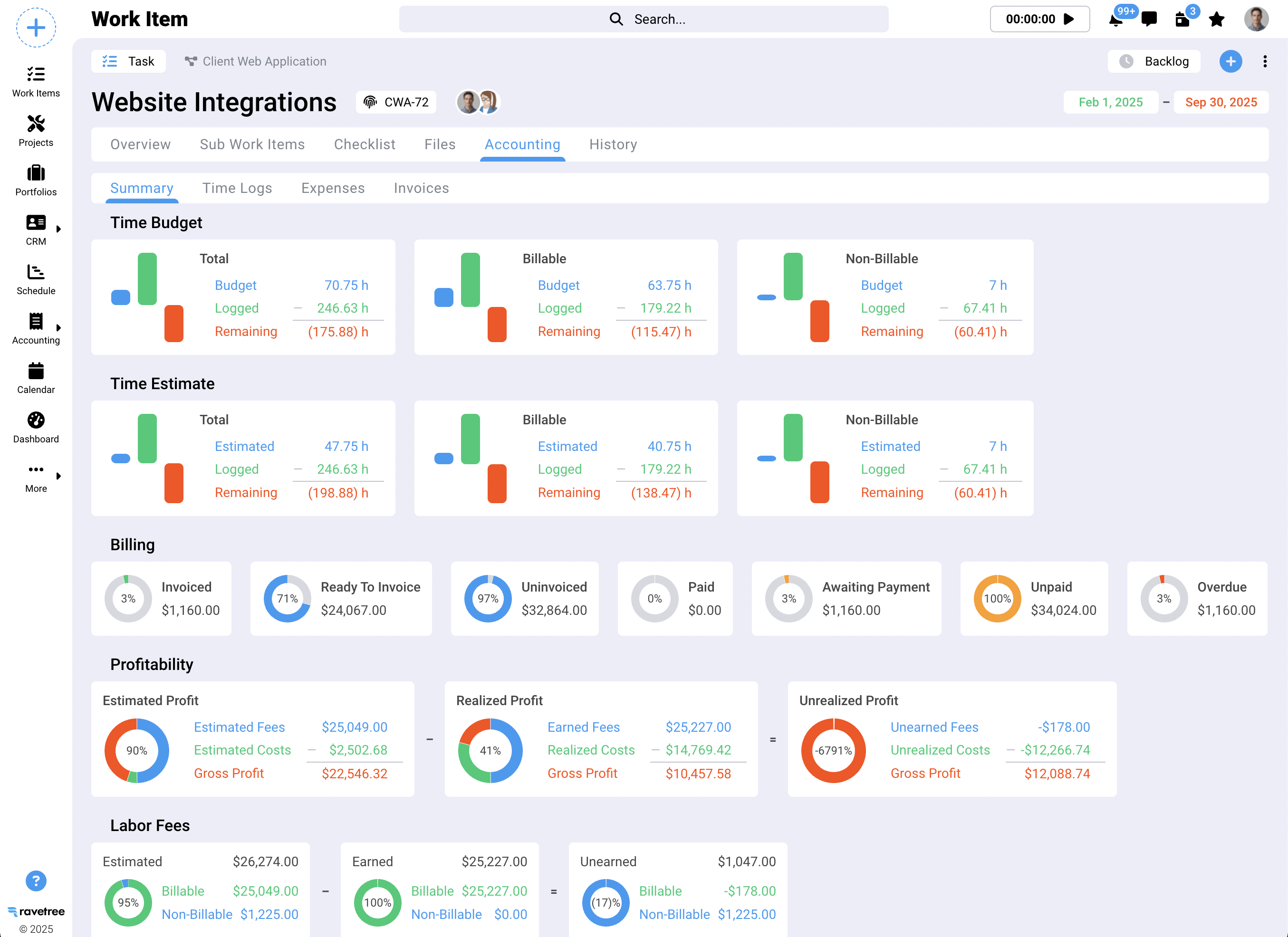
Conclusion
The BigTime vs. Scoro decision ultimately depends on organizational priorities, operational complexity, and implementation capacity. BigTime excels for organizations prioritizing time tracking accuracy and project accounting precision, while Scoro serves organizations requiring comprehensive business management integration.
However, the choice between these platforms may represent a false dichotomy for many professional services organizations. The most effective platform combines focused functionality with comprehensive integration, delivered through user experiences that encourage adoption rather than creating barriers.
Successful platform selection requires thorough evaluation of actual operational requirements rather than feature checklists, comprehensive cost analysis including implementation and training expenses, and realistic assessment of organizational capacity for change management.
The rapidly evolving professional services technology landscape offers innovative alternatives that address the limitations inherent in choosing between focused versus comprehensive approaches. Organizations investing time in thorough evaluation, including consideration of platforms specifically designed for professional services workflows, position themselves for sustained competitive advantage through strategic technology decisions.
When evaluating BigTime vs. Scoro, remember that the best platform is ultimately the one your team will adopt enthusiastically and utilize effectively to deliver exceptional client service while achieving sustainable business growth.
Frequently Asked Questions
What are the main differences between BigTime and Scoro?
BigTime focuses primarily on time tracking and project accounting, while Scoro offers comprehensive business management including CRM, financial management, and advanced reporting in addition to project management capabilities.
Which platform is better for small agencies?
BigTime typically serves smaller agencies better due to its simpler interface and focused functionality, while Scoro may be overwhelming for teams with basic operational requirements.
How do implementation timelines compare between these platforms?
BigTime generally requires shorter implementation timelines due to its focused feature set, while Scoro's comprehensive capabilities typically demand more extensive setup and training periods.
Can either platform integrate with existing accounting systems?
Both platforms offer accounting system integrations, though their approaches differ based on their overall platform philosophies and integration capabilities.
What should organizations prioritize when choosing between these platforms?
Organizations should prioritize actual operational requirements over feature abundance, considering user adoption capacity, implementation resources, and long-term scalability needs.
Are there alternative platforms worth considering?
Yes, platforms like Ravetree offer balanced approaches that combine essential functionality with user-friendly interfaces specifically designed for professional services organizations.
How do pricing models compare between BigTime and Scoro?
BigTime typically offers more straightforward pricing with fewer tiers, while Scoro's comprehensive features usually command higher subscription fees but potentially eliminate needs for multiple specialized tools.
Which platform provides better client collaboration features?
Scoro generally offers more sophisticated client collaboration capabilities, while BigTime's client portal functionality remains more basic and focused on project delivery.


